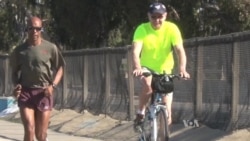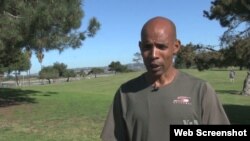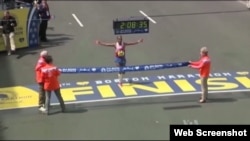African-born Meb Keflezighi will be the oldest U.S. Olympic runner in history when he competes in the marathon at the 2016 Summer Games in Rio de Janeiro. He will be 41 years old.
Keflezighi, in training and racing, has run enough kilometers to circle the globe more than four times. He already has been to the Olympics three times and won a silver medal at the 2004 Athens Olympics.
His athletics career started in middle school. “I ran a 5:20 mile and that got me an “A.” [I] got a T-shirt and a lot of recognition and that’s how it kind of got me out of my shyness,” Keflezighi told VOA.
One of the reasons Keflezighi was shy in school was he arrived in the U.S. as a refugee from war-torn Eritrea in East Africa.
“My first 10 years in Eritrea was difficult. You didn’t know what the future holds. You didn’t have opportunities to go to school. There were soldiers everywhere [and] land mines scattered around the country, so it was a horrific scene to be for a kid to grow up to, but unfortunately that was the card that I was dealt, but my parents made a decision to escape.”
Flight to US
Keflezighi’s father walked more than 360 kilometers to Sudan and eventually was able to help his entire family — a wife and six children — escape. They settled in San Diego, but in the U.S., there were new challenges to overcome.
“The language is different so you can’t just say what you want to express. Sometimes you can’t even say anything just because you don’t know the words, so you kind of feel like kind of mute and some people make fun of you whether [it's] the clothes that you wear, or you don’t speak,” Keflezighi said.
Bob Larsen, Keflezighi’s coach of more than 20 years, said he offered Keflezighi a full scholarship to the University of California Los Angeles in part because he saw toughness in him.
“He’s an exceptional person and a big part, I think, is growing up in tough circumstances and being in a large family doing some of those things routinely that would upset other people. He’d travel anywhere. He’d sleep anywhere. The whole family is tough,” said Larsen.
Larsen said Keflezighi has the ability to mentally handle pressure in extreme situations, which has made him successful in many marathons.
“He’s won New York [in 2009]; he’s won Boston. Nobody’s done that and won an Olympic medal like he has,” he said.
Facing challenges
Keflezighi ran the Boston Marathon the year after terrorists bombed the event in 2013. He said crossing the finish line at the Boston Marathon meant more to him than winning an Olympic medal.
“Boston Marathon 2014 [was] the most epic moment for my career. It’s the most meaningful victory I know. That 5:20 mile translated to the Boston Marathon, and I could feel that was the plateau of my career, and I was meant to be on this earth to be a runner to help others, influence [others] in a positive way,” said Keflezighi.
He became a testament to America’s resilience in the wake of the bombings by becoming the first American in 31 years to win the Boston Marathon.
Come August at the Summer Olympics in Rio, Keflezighi will have a shot at becoming the oldest American runner to win an Olympic medal when he lines up to take part in the marathon.








